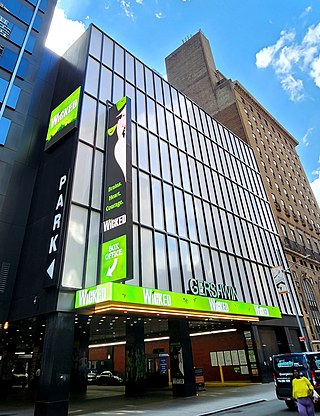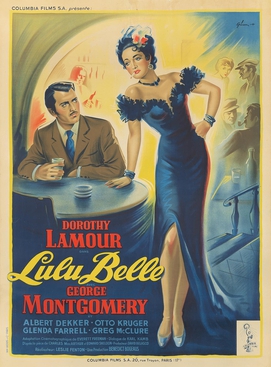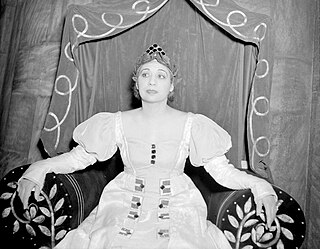Related Research Articles

The Front Page is a Broadway comedy about newspaper reporters on the police beat. Written by former Chicago reporters Ben Hecht and Charles MacArthur, it was first produced in 1928 and has been adapted for the cinema several times. The play entered the public domain in the United States in 2024.

In Dahomey: A Negro Musical Comedy is a landmark 1903 American musical comedy described by theatre historian Gerald Bordman as "the first full-length musical written and played by blacks to be performed at a major Broadway house." It features music by Will Marion Cook, book by Jesse A. Shipp, and lyrics by poet Paul Laurence Dunbar. It was written by Jesse A. Shipp as a satire on the American Colonization Society's back-to-Africa movement of the earlier nineteenth century.

Howard da Silva was an American actor, director and musical performer on stage, film, television and radio. He was cast in dozens of productions on the New York stage, appeared in more than two dozen television programs, and acted in more than fifty feature films. Adept at both drama and musicals on the stage, he originated the role of Jud Fry in the original 1943 run of the Rodgers and Hammerstein musical Oklahoma!, and also portrayed the prosecuting attorney in the 1957 stage production of Compulsion. Da Silva was nominated for a 1960 Tony Award as Best Featured Actor in a Musical for his work in Fiorello!, a musical about New York City mayor LaGuardia. In 1961, da Silva directed Purlie Victorious, by Ossie Davis.
Lew Leslie was a Jewish American writer and producer of Broadway shows. Leslie got his start in show business in vaudeville in his early twenties. Although white, he was the first major impresario to present African American artists on the Broadway stage. He had two well-known wives, torch singer Belle Baker and Ziegfeld Follies showgirl Irene Wales.

Shuffle Along is a musical composed by Eubie Blake, with lyrics by Noble Sissle and a book written by the comedy duo Flournoy Miller and Aubrey Lyles. One of the most notable all-Black hit Broadway shows, it was a landmark in African-American musical theater, credited with inspiring the Harlem Renaissance of the 1920s and '30s.

The St. James Theatre, originally Erlanger's Theatre, is a Broadway theater at 246 West 44th Street in the Theater District of Midtown Manhattan in New York City. Opened in 1927, it was designed by Warren and Wetmore in a neo-Georgian style and was constructed for A. L. Erlanger. It has 1,709 seats across three levels and is operated by Jujamcyn Theaters. Both the facade and the auditorium interior are New York City landmarks.

African-American musical theater includes late 19th- and early 20th-century musical theater productions by African Americans in New York City and Chicago. Actors from troupes such as the Lafayette Players also crossed over into film. The Pekin Theatre in Chicago was a popular and influential venue.

The Gershwin Theatre is a Broadway theater at 222 West 51st Street, on the second floor of the Paramount Plaza office building, in the Midtown Manhattan neighborhood of New York City. Opened in 1972, it is operated by the Nederlander Organization and is named after brothers George and Ira Gershwin, who wrote several Broadway musicals. The Gershwin is Broadway's largest theater, with approximately 1,933 seats across two levels. Over the years, it has hosted musicals, dance companies, and concerts.

The Stephen Sondheim Theatre, formerly Henry Miller's Theatre, is a Broadway theater at 124 West 43rd Street in the Theater District of Midtown Manhattan in New York City. Owned by the Durst Organization and managed by the Roundabout Theatre Company, the modern 1,055-seat theater opened in 2009 at the base of the Bank of America Tower. The current theater is mostly underground and was designed by Cookfox, architects of the Bank of America Tower. It retains the landmarked facade of the original Henry Miller's Theatre, which was built in 1918 by Henry Miller, the actor and producer.

The Lafayette Theatre(1912–1951), known locally as "the House Beautiful", was one of the most famous theaters in Harlem. It was an entertainment venue located at 132nd Street and 7th Avenue in Harlem, New York. The structure was demolished in 2013.

Harry Lawrence Freeman was an American neoromantic opera composer, conductor, impresario and teacher. He was the first African-American to write an opera that was successfully produced. Freeman founded the Freeman School of Music and the Freeman School of Grand Opera, as well as several short-lived opera companies which gave first performances of his own compositions. During his life, he was known as "the black Wagner."
Josie de Guzman, also known as Jossie de Guzman, is an American actress and singer of Puerto Rican descent, best known for work in the theatre.
The John Gore Organization (JGO), formerly known as Key Brand Entertainment (KBE), is a producer and distributor of live theater in North America, as well as an e-commerce company, focused on theater. KBE was founded in the UK in 2004 by 14-time Tony Award-winning Producer John Gore who is the company's Chairman, CEO and Owner.

Lulu Belle is a 1948 American drama musical romance film directed by Leslie Fenton and starring Dorothy Lamour. The film was a loose and highly sanitized adaption of Charles MacArthur and Edward Sheldon's hit 1926 Broadway play of the same name. The play was a critique of American middle class morality and inter-racial relationships and told the story of Lulu Belle, a black cabaret performer and prostitute in Harlem, who becomes the object of desire for first a white married barber and later a white boxer.
A number of theatre companies are associated with the Harlem Renaissance.

Donald Heywood was a Trinidadian-born American songwriter, composer, writer and director. He composed for "I'm Coming Virginia" in 1926, which became a hit for Ethel Waters. He became a prominent figure in black musical theater, and produced scores for films such as Moon Over Harlem (1939) and Murder on Lenox Avenue (1941).
Rang Tang is a musical that premiered July 12, 1927, on Broadway at the Royale Theater and ran for 119 performances, including a 14-week overrun, during which, the production moved September 12, 1927, to the Majestic – finishing October 24, 1927. It was acclaimed as one of the most successful black musical revues of the latter 1920s, and owed much to a star-laden cast headlined by Flournoy Miller and Aubrey Lyles. The book — in 2 acts and 12 scenes — is by Kaj Gynt; the lyrics are by Joseph H. Trent; the music is composed by Ford Dabney, who tailored some of the songs for Mae Barnes and Evelyn Preer; the score and post-production music was published by Leo Feist; all copyrighted in 1927 and copyrights renewed in 1954.

Jack Whiting was an American actor, singer and dancer whose career ran from the early 1920s through the late 1950s, playing leading men or major supporting figures.

Edna Lewis Thomas was an American stage actress whose career began in New York City during the Harlem Renaissance. She appeared on Broadway, with the Lafayette Players theater company, and in productions by the Federal Theater Project of the Works Progress Administration. Her portrayal of Lady Macbeth in Orson Welles' all-Black "Voodoo" Macbeth in 1936 was much acclaimed. She was an influential figure in Black theater, and was a member of the Alhambra Players and the Harlem Experimental Theatre. She only appeared on screen once, in the 1951 film A Streetcar Named Desire.
Elizabeth Williams was an American stage actress and theater impresario who was actively performing during the first half of the 20th century. She was part of the first generation of black actresses in the dramatic repertory on the American stage, and is believed to be one of the first African-American women to establish her own stock theatre company, the Oriental Empire Stock Company, in 1902. She later was an active member of the Lafayette Stock Company in Harlem. In addition to her work in stage plays, she also performed in Broadway musicals.
References
- 1 2 3 4 Fisher, James; Hardison Londré, Felicia (2009). "Lulu Belle". The A to Z of American Theater:Modernism. Scarecrow Press. ISBN 978-0-8108-6884-7.
- ↑ League, The Broadway. "Lulu Belle – Broadway Play – Original | IBDB". www.ibdb.com. Retrieved 2021-04-14.
- ↑ Marra, Kim; Schanke, Robert A. (2002). Staging Desire: Queer Readings of American Theater History. University of Michigan Press. ISBN 978-0-472-06749-7.
- ↑ "Boston to Bar 'Lulu Belle,' Mayor Unofficially Decides". The New York Times . March 24, 1928. p. 11.
- ↑ "Lulu Belle". Oxford Reference. Retrieved 2021-04-14.